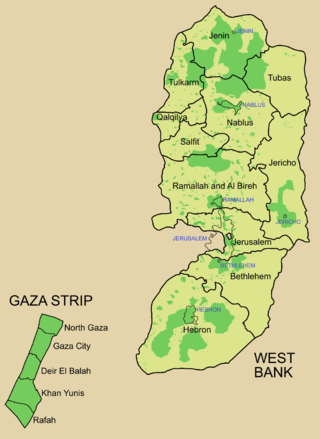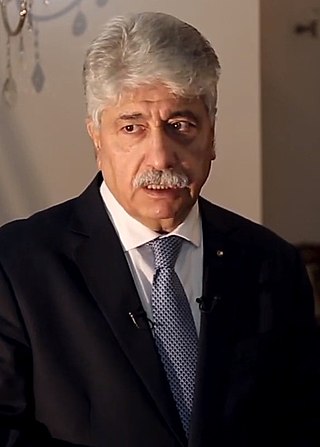Related Research Articles

The Palestinian National Authority, commonly known as the Palestinian Authority and officially the State of Palestine, is the Fatah-controlled government body that exercises partial civil control over West Bank areas "A" and "B" as a consequence of the 1993–1995 Oslo Accords. The Palestinian Authority controlled the Gaza Strip prior to the Palestinian elections of 2006 and the subsequent Gaza conflict between the Fatah and Hamas parties, when it lost control to Hamas; the PA continues to claim the Gaza Strip, although Hamas exercises de facto control. Since January 2013, the Palestinian Authority has used the name "State of Palestine" on official documents, although the United Nations continues to recognize the Palestinian Liberation Organization (PLO) as the "representative of the Palestinian people".

The United Nations Relief and Works Agency for Palestine Refugees in the Near East (UNRWA) is a UN agency that supports the relief and human development of Palestinian refugees. UNRWA's mandate encompasses Palestinians displaced by the 1948 Palestine War and subsequent conflicts, as well as their descendants, including legally adopted children. As of 2019, more than 5.6 million Palestinians are registered with UNRWA as refugees.

The Israeli–Palestinian conflict is one of the world's most enduring conflicts, beginning in the mid-20th century. Various attempts have been made to resolve the conflict as part of the Israeli–Palestinian peace process, alongside other efforts to resolve the broader Arab–Israeli conflict. Public declarations of claims to a Jewish homeland in Palestine, including the First Zionist Congress of 1897 and the Balfour Declaration of 1917, created early tensions in the region after waves of Jewish immigration. Following World War I, the Mandate for Palestine included a binding obligation for the "establishment in Palestine of a national home for the Jewish people". Tensions grew into open sectarian conflict between Jews and Arabs. The 1947 United Nations Partition Plan for Palestine was never implemented and provoked the 1947–1949 Palestine War. The current Israeli-Palestinian status quo began following Israeli military occupation of the West Bank and Gaza in the 1967 Six-Day War, known as the Palestinian territories.

The First Intifada or First Palestinian Intifada, also known simply as the intifada or the intifadah, was a sustained series of protests and violent riots carried out by Palestinians in the Palestinian Territories and Israel. It was motivated by collective Palestinian frustration over Israel's military occupation of the West Bank and the Gaza Strip, as it approached a twenty-year mark, having begun after Israel's victory in the 1967 Arab–Israeli War. The uprising lasted from December 1987 until the Madrid Conference of 1991, though some date its conclusion to 1993, with the signing of the Oslo Accords.

The Palestinian territories are the two regions of the former British Mandate for Palestine that have been militarily occupied by Israel since the Six-Day War of 1967, namely: the West Bank and the Gaza Strip. The International Court of Justice (ICJ) has referred to the West Bank, including East Jerusalem, as "the Occupied Palestinian Territory", and this term was used as the legal definition by the ICJ in its advisory opinion of July 2004. The term occupied Palestinian territory was used by the United Nations and other international organizations between October 1999 and December 2012 to refer to areas controlled by the Palestinian National Authority, but from 2012, when Palestine was admitted as one of its non-member observer states, the United Nations started using exclusively the name State of Palestine. The European Union (EU) also adopts the term occupied Palestinian territory, with a parallel term Palestinian Authority territories also occasionally used. The government of Israel and its supporters use the label "disputed territories" instead.

Palestine, officially the State of Palestine, is a state located in the Southern Levant region of West Asia. Officially governed by the Palestine Liberation Organization (PLO), it claims the West Bank and the Gaza Strip as its territory, though the entirety of that territory has been under Israeli occupation since the 1967 Six-Day War. As a result of the Oslo Accords of 1993–1995, the West Bank is currently divided into 165 Palestinian enclaves that are under partial Palestinian National Authority (PNA) rule; the remainder, including 200 Israeli settlements, is under full Israeli control. The Gaza Strip has been ruled by the militant Islamic group Hamas and has been subject to a long-term blockade by Egypt and Israel since 2007.
The Judea and Samaria Area is an administrative division of Israel. It encompasses the entire West Bank, which has been occupied by Israel since 1967, but excludes East Jerusalem. Its area is split into 165 Palestinian "islands" that are under total or partial civil administration by the Palestinian National Authority (PNA), and a contiguous area containing 230 Israeli settlements into which Israeli law is "pipelined".

The one-state solution, sometimes also called a bi-national state, is a proposed approach to resolving the Israeli–Palestinian conflict, according to which one state must be established between the River Jordan and the Mediterranean. Proponents of this solution advocate a single state in Israel, the West Bank and the Gaza Strip. The term one-state reality describes the belief that the current situation in Israel/Palestine is de facto one-state.

Media coverage of the Arab–Israeli conflict by journalists in international news media has been said to be biased by both sides and independent observers. These perceptions of bias, possibly exacerbated by the hostile media effect, have generated more complaints of partisan reporting than any other news topic and have led to a proliferation of media watchdog groups.

The Israeli disengagement from Gaza was the unilateral dismantling in 2005 of the 21 Israeli settlements in the Gaza Strip and the evacuation of Israeli settlers and army from inside the Gaza Strip.

Isratin, also known as the bi-national state, is a proposed unitary, federal or confederate Israeli-Palestinian state encompassing the present territory of Israel, the West Bank and the Gaza Strip. Depending on various points of view, such a scenario is presented as a desirable one-state solution to resolving the Israeli–Palestinian conflict, or as a calamity in which Israel would ostensibly lose its character as a Jewish state and the Palestinians would fail to achieve their national independence within a two-state solution. Increasingly, Isratin is being discussed not as an intentional political solution – desired or undesired – but as the probable, inevitable outcome of the continuous growth of the Jewish settlements in the West Bank and the seemingly irrevocable entrenchment of the Israeli occupation there since 1967.

Palestinian political violence refers to acts of violence perpetrated for political ends in relation to the State of Palestine or in connection with Palestinian nationalism. Common political objectives include self-determination in and sovereignty over Palestine, or the "liberation of Palestine" and recognition of a Palestinian state, either in place of both Israel and the Palestinian territories, or solely in the Palestinian territories. More limited goals include the release of Palestinian prisoners or the Palestinian right of return. Other motivations include personal grievances, trauma or revenge.

Israel is an associated state of the European Union. The relations between the two are framed in the European Neighbourhood Policy (ENP), the Euro-Mediterranean Partnership, and the Union for the Mediterranean.

The next Palestinian legislative election was scheduled for 22 May 2021, according to a decree by President Mahmoud Abbas on 15 January 2021, but was indefinitely postponed on 29 April 2021.

Since 2001, Palestinian militants have launched thousands of rocket and mortar attacks on Israel from the Gaza Strip as part of the continuing Arab–Israeli conflict. The attacks, widely condemned for targeting civilians, have been described as terrorism by the United Nations, the European Union, and Israeli officials, and are defined as war crimes by human rights groups Amnesty International and Human Rights Watch. The international community considers indiscriminate attacks on civilian targets to be illegal under international law.
Tourism in the Palestinian territories is tourism in East Jerusalem, the West Bank, and the Gaza Strip. In 2010, 4.6 million people visited the Palestinian territories, compared to 2.6 million in 2009. Of that number, 2.2 million were foreign tourists while 2.7 million were domestic. In the last quarter of 2012 over 150,000 guests stayed in West Bank hotels; 40% were European and 9% were from the United States and Canada. Major travel guides write that "the West Bank is not the easiest place in which to travel but the effort is richly rewarded."

Ahmed Majdalani is a Palestinian politician, university professor and researcher. A former Palestinian government minister, he currently serves as Secretary-General of the Palestinian Popular Struggle Front (PPSF) and is a senior member of the PLO Executive Committee which is considered the highest political level in Palestine

The two-state solution to the Israeli–Palestinian conflict envisions an independent State of Palestine alongside the State of Israel, west of the Jordan River. The boundary between the two states is still subject to dispute and negotiation, with Palestinian and Arab leadership demanding full Israeli withdrawal from territories it occupied in 1967, which is rejected by Israel. The territory of the former Mandate Palestine, which did not form part of the Palestinian State, would continue to be part of Israel.

Area C is the fully Israeli-controlled and only contiguous territory in the West Bank, defined as the whole area outside the Palestinian enclaves. Area C constitutes about 61 percent of the West Bank territory, contains all Israeli settlements other than those in East Jerusalem, and more than 99% of the area is off limits or heavily restricted for Palestinians. The area was committed in 1995 under the Oslo II Accord to be "gradually transferred to Palestinian jurisdiction", but such transfer did not happen. The area is richly endowed with natural resources.

Jordan–Palestine relations are the strong, historical, but sometimes unstable, bilateral relations between the Hashemite Kingdom of Jordan and the State of Palestine.
References
- ↑ The Jerusalem Media and Communications Centre, About JMCC
- 1 2 Fox, Elizabeth. "Assessment of Behavior Change Communication Capacity in the West Bank and Gaza" (PDF). USAID . Retrieved 19 May 2012.
- ↑ Jallov, Birgitte. "Journalism as a Tool for the Formation of a Free, Informed and Participatory Democratic Development" (PDF). Swedish International Development Cooperation Agency . Retrieved 19 May 2012.
- ↑ "About bitterlemons". www.bitterlemons.net. Archived from the original on 2022-11-25. Retrieved 2015-09-25.
- ↑ Khalidi, Rashid (2007). The Iron Cage - The Story of the Palestinian Struggle for Statehood . Oneworld Publications. p. 256. ISBN 9781851685325.
- ↑ "News Agencies". Mission of Palestine in Denmark. Archived from the original on 26 October 2021. Retrieved 19 May 2012.
- ↑ "Guide to worldwide institutions measuring public opinion" (PDF). Egypt Information Portal (http://www.eip.gov.eg). Archived from the original (PDF) on 10 March 2016. Retrieved 19 May 2012.
- ↑ Beinin, Joel (Jul–Aug 1993). "Rethinking Palestinian Politics". Middle East Report. No. 183 (Political Islam): 41–42. JSTOR 3012578.